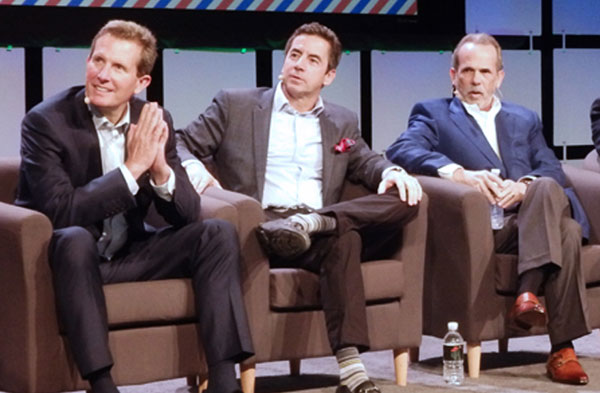✕

Column: industry Tag: Marriott International,Marriott,Brand scale,technology Published: 2017-11-06 13:28 Source: Author:

PHOENIX—As more and more brands emerge and technology continues to change at a fast clip, the effects on the hotel industry are not all good, according to executives who spoke on a general session panel titled “A view from the top” during the first day of The Lodging Conference.
“I think scale is very important and very competitive now, and if a hotel company doesn’t have scale, it’s really hard to compete,” said David Kong, president and CEO of Best Western Hotels & Resorts.
He pointed to Marriott International as an example.
“They can spend so much more money and so much more frequently in everything—not just in technology, it’s also in sales, it’s also in marketing,” Kong said. “You think about the synergy that they have. They go and make a franchise sales (score), they can sell 30 brands.”
Kong added that consumers want a lot of choices now, which is why having a variety of brands can be attractive.
Dave Johnson, president and CEO of Aimbridge Hospitality, said another benefit of having scale is the ability to recruit good talent and keep them on board.
“What scale (has) given me is (the ability) to keep that talent inside and develop that talent,” he said. “They don’t have to leave my organization. … Is the brand more important, is the manager more important or is the GM more important? I think we’d be unanimous in saying, ‘You give me an A-player GM, he or she is going to make my hotel successful.’”
But Mike Barnello, president and CEO of LaSalle Hotel Properties, said not everyone in the every market benefits from the proliferation of brands and scale of hotel companies.
“We have both. We have a lot of independent hotels; we have pretty much every brand,” he said. “So when we look at those, it’s not (as easy as saying) we’ve got another hotel around the corner, (but) it’s got a different name, (so) there’s no impact at all. There is impact. I don’t know that two years ago there were billions of consumers that were just waiting for (Hilton’s Tapestry) brand to be created. I find that hard to believe.”
That doesn’t mean guests aren’t going to stay at Tapestry properties, Barnello said, but they might be loyal customers coming from another Hilton brand.
With all of these new brands, communication between owners and the brand is often more complicated, too, he said.
“There’s a huge value for an owner to be able to pick up the phone and call the top guys at that brand and the top guys at that management company because you know exactly they’re on it versus the people that run 2,000 hotels,” he said.
Saturation
Geoff Ballotti, president and CEO of Wyndham Hotel Group, said he doesn’t think there are too many brands, adding that “all of us as distributors are filling needs of distribution.”
He noted Wyndham’s announcement this week that it has added six hotels to its Trademark soft-brand collection, which already included 55 properties.
“I think it is about distribution, it’s about contribution for our owners,” he said, “it’s about our ability at a time where we feel technology has never mattered more in terms of what we provide to our franchisees and our owners, in terms of the roomnights we could drive, in terms of the rate we could drive, in terms of the occupancy and the RevPAR we could drive.”
Ballotti said he doesn’t think the industry has reached a point of oversaturation, because the new brands are attached to leading loyalty, distribution and reservation systems.
“We’ve heard from our competitors that they’re looking at more, and certainly consumers and hoteliers and developers are buying those brands,” he said.
Technology
New technology innovations are always making their way into the hotel industry, but some panelists said that isn’t their main focus.
Eric Danziger, president and CEO of Trump Hotels International, said the industry relies too much on technology. He added there’s a lot of “me too” in the industry, meaning people do things to keep up with other companies.
“I think we just need to retrace a little bit” and get back to the business of hospitality, he said.
Barnello said LaSalle watches how different types of technology play out for others in the industry before jumping into adoption.
“We’re watching all these people put in these keyless door systems, where you can use your phone to get into your hotel, and I think that’s really neat and at some point … we’ll all have those,” Barnello said. “But I have not heard a story of anybody choosing their hotel because the door was able to be opened by their phone. If that happens, then maybe it will be a good thing for us, but … we’re of the mind to wait until that becomes something that’s required, and then also perfected, to take it on.”
Previous:RLHC continued franchise-business growth momentum in Q3
Next:One&Only Kéa Island Resort Coming to In Greece
Hot key words
Hot Products
Popular Vendors